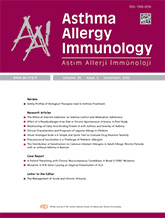


Objective: The role of dietary factors in the etiopathogenesis of chronic spontaneous urticaria (CSU) has been a matter of discussion and it is widely accepted that most urticaria cases triggered by food are caused by pseudoallergic reactions. In this prospective study, our aim was to investigate the effect of a pseudoallergen-free diet (PAFD) on disease activity, the need for antihistamine use, and the quality of life in patients with CSU.
Materials and Methods: The study included adult patients who were on follow up for CSU for a duration of at least 6 months and had symptoms every day or every other day. The patients were given a food diary, which also included assessment of daily disease activity. The daily Urticaria Activity Score (UAS), the Chronic Urticaria Quality of Life Questionnaire score at baseline and at the 4th week, and frequency of antihistamine use were obtained. According to the change in UAS (ΔUAS), the patients` response to PAFD was classified as strong (ΔUAS≥8), partial (8>ΔUAS≥4), or no response (ΔUAS<4).
Results: Twenty-three patients, 19 females (82.6%) and 4 males (17.4%), completed the study, the mean age was 43±4.6 years. According to ΔUAS, 6 patients (26.1%) had strong response, 6 (26.1%) had partial response, and 11 (47.8%) were unresponsive to PAFD. The mean ΔUAS value of the patients who responded to PAFD was 8.1 (min:4, max:15). At the end of the study, 9 (39.1%) patients had a significant improvement in their quality of life. There were 6 (26%) patients who both responded to PAFD and had improved quality of life scores. The frequency of antihistamine use decreased in 10 (43.5%) patients.
Conclusion: PAFD may help decrease disease activity in CSU. We observed that the frequency of antihistamine use could be reduced and the patient`s quality of life could be improved by adding PFAD to antihistamine therapy.